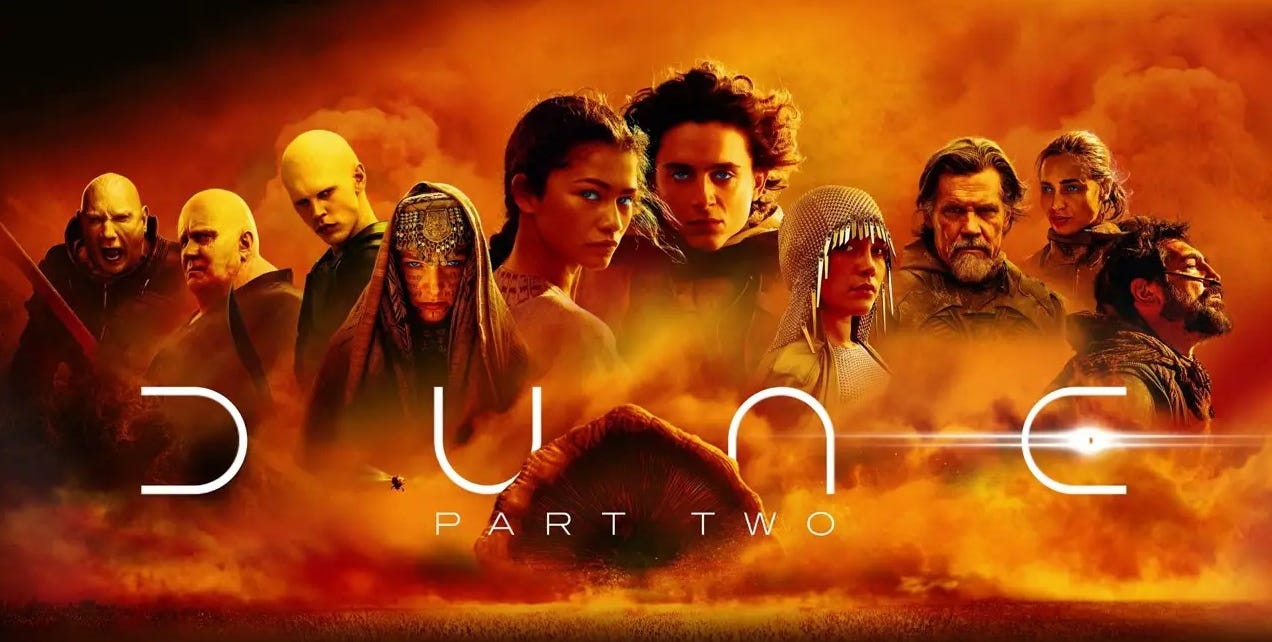Dune: Part Two - The Feminist Breakup Movie
Every person who has recommended that I read Frank Herbert’s 1965 novel Dune has been a White male. I walked out of the theater after watching Dune: Part Two feeling ready to smash the patriarchy.
The modern reboot of the Dune franchize, starting with the first film in 2021, is the definition of a blockbuster hit. The 2024 sequel Dune: Part Two has grossed over $700 million worldwide, with a prequel TV show streaming on HBO’s Max. Gen-Z celebrity icons Timothee Chalamet and Zendaya drew in a new crop of fans. Scifi lovers flooded the theaters too, preemptively skeptical about how Hollywood would handle their sacred text. I read the book first, surprised that it was not in fact a riddle of gibberish as Tiktok book influencers might want you to believe.The first film was pretty one-to-one in terms of sticking to the novel’s plot. Part Two had one of the most noteworthy plot deviations I’ve seen in a flim. And no one is talking about it.
The Bene Gesserit is an all-female religious order in the Dune universe who control royal bloodlines, usually by marrying into a family and birthing children. Their religious order makes up a majority of the female cast, so it’s no surprise that conversations about feminism in Dune often relate to the Bene Gesserit. Kenny K over at Dune Scholar, a website dedicated to the Duniverse, says the film's portrayal of women is an "abomination". Chloe Joe over at Bustle describes the Bene Gesserit as “midwifing interplanetary colonialism,” which I find hilariously accurate. Chloe argues that the Bene Gesserit’s midwife club feeds into the existing patriarchal power structure by furthering the agenda of colonization. I totally agree. But I think Chloe and other Dune nerds across the internet are kind of missing the point. The filmmakers deviated from the novel in a very big way, one that is an undeniably feminist take. They just didn’t do it using the Bene Gesserit. Because, as Chloe astutely points out, the Bene Gesserit can never be feminist in the way modern viewers want - they are the long arm of the patriarchy. The film does take a feminist stance in another way: it uses Chani’s rejection of Paul.
Chani is one of the Fremen, the indigenous people living on the planet that our main character Paul’s family arrives to colonize. Paul is a noble and his family is sent to the planet Dune to harvest its natural resources (one in particular, it's spicy). Another royal family, the Harkonnens, have been brutally oppressing the Fremen on Dune for generations. Paul and his mother end up living with the Fremen and integrate themselves into Fremen culture. But by the end of the novel, and the film, Paul has decided to marry into the imperial structure that wants to destroy the Fremen. Pau’s long-term romantic partner Chani stays by his side in the novel, pushed to the sidelines as he marries another woman. She is unhappy but goes along with it. This sort of narrative simply would not fly in 2024; we live in a post-Greta Gerwig society, after all. In the film, Chani doesn’t settle for second seat. She leaves her deadbeat emperor boyfriend so he can marry his colonial princess, resisting a narrative from the novel that screams of 1960s gender politics.
In a responsible conversation about feminism in Dune: Part Two, we can’t ignore the central female character in the story. It’s easy to look at the Bene Gesserit and complain that they exude Girl Power in all the wrong ways. But when we talk about Chani, we’re faced with questions like, “what does it look like to walk away from the system of oppression altogether?” Paul’s choice to marry the princess doesn’t sting as sharply in the novel, because Chani stays by his side. But what does it mean that Paul chooses the colonial power over the woman he loves? What does it mean that love does not conquer all, that a woman is right to leave when a man’s actions fly in the face of her values?
There are so many voices talking about the portrayal of the White women in the film, how the film’s feminism falls short. But Zendaya is literally right there! She rides a worm, the ultimate symbol of Freman liberation, and ditches Paul to presumably lead her own insurrection. I get that it’s not the feminism they wanted. But I think that’s the whole point. The film is telling us to be more like Chani, to refuse as a form of resistance. To say, “I cannot achieve equality if I remain part of this system, and so I will leave.” Maybe the Bene Gesserit aren’t feminist because colonial systems are designed to keep us all down. Maybe we should ride the worm, too.





Comments
Post a Comment